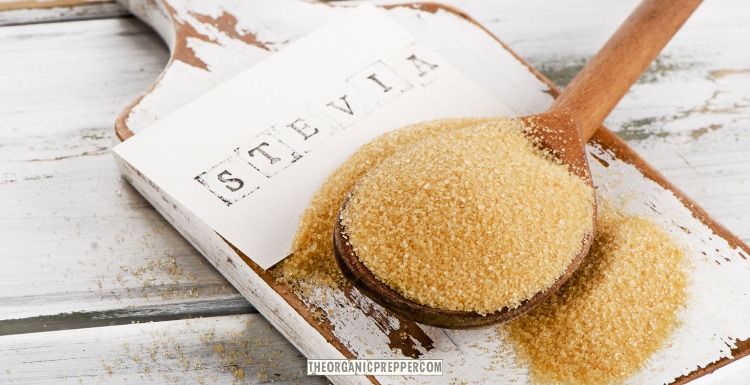If you're new here, you may want to subscribe to my RSS feed. Thanks for visiting!
Sugar is yet another thing that can be difficult to come by these days. It was rationed during the lockdowns and has risen in price along with everything else. And it’s in everything, usually in the form of high fructose corn syrup (HFCS). Processed sugar causes many health problems, from chronic inflammation to cardiovascular disease.
Diabetics have to monitor sugar levels carefully, and sugar isn’t good for the keto diet crowd either. So why not look for some healthier alternatives? Some of these can even be grown in the garden!
Stevia (Stevia rebaudiana)
Stevia is one of the alternatives that can be grown in the garden. In fact, I saw some for sale when I visited my local garden center, so I’d think the plant is easily available elsewhere. The leaves are processed to extract the sweetener. Stevia does have both benefits and downsides, so some due diligence can’t hurt. While stevia can act as an appetite suppressant, preliminary research has suggested that it’s harmful to the gut biome. Stevia is suggested as a sugar alternative for diabetics as well.
This site shows an alcohol-based extraction process requiring only stevia leaves and vodka. I’m sure other alcohols such as Everclear would work just fine.
Monk fruit sweetener
Monk fruit is actually native to southern China but can be grown in the US if given the correct conditions, namely subtropical. It’s received the GRAS (generally recognized as safe) classification, and preliminary research has shown it safe for children, pregnant/breastfeeding women, and diabetics. If it can’t be grown in your zone, there are a number of sellers online.
(Looking to keep your pantry fully stocked no matter what comes? Check out our free QUICKSTART Guide to building your 3-layer food storage plan.)
Sugar beets (Beta vulgaris)
Not to be confused with the “other” beet, sugar beets have been cultivated for centuries for the sugars. This is a long time to mature crop, requiring 170-200 days along with mild temperatures and a cold snap at the end of the growth period for maximum sucrose production.
For those with shorter growing seasons, such as myself, this might be a good use of a Kratky apparatus, perhaps a large tote, since this is a root crop, and root crops aren’t really suited to small reservoirs. A cold snap can be easily provided by putting the plant outside or in a cooler area, such as a basement, under lights.
Yacon, aka sunroot (Smallanthus sonchifolius)
This is a perennial in subtropical regions but can be grown as an annual in more temperate zones. It’s grown from rhizomes, which can be harvested and eaten in a variety of ways. This site gives some interesting history along with a cultivation and care guide.
The overall process of making the syrup is pretty simple: peel, boil, scrape off the foam and keep boiling & stirring until it has a consistency resembling honey. Pour into a sterile jar and store. It should be good for up to one year.
Maple syrup
This stuff was gold in our house as I was growing up! It’s made from the sap of the maple tree and does take quite the process to make, but it is readily available at farmer’s markets in my area. Not cheap but very, very yummy with a number of health benefits.
These benefits include a high level of antioxidants along with a number of vitamins and minerals. Some research suggests benefits to both the heart and immune system. By buying it locally, you’re supporting your local small business. What’s not to love? However, this should probably be avoided by those on a keto diet since it’s high in sugar and carbs.
(Want uninterrupted access to The Organic Prepper? Check out our paid-subscription newsletter.)
Raw honey
Another natural source of sugars, raw honey contains a number of antioxidants as well as bee pollen and bee propolis, a resin-like material bees use to build hives.
Honey of both kinds possesses wound-healing, anti-bacterial, and anti-inflammatory properties and has been used in medicine for hundreds of years. This is another thing that’s likely best purchased unless you’re a beekeeper yourself, and as such is another wonderful way to support small businesses. Please note that honey should be avoided if you’re on the keto diet, being another food that’s high in sugar and carbs.
The point is that you have options.
Obviously, there are a number of artificial sweeteners on the market, from saccharin to aspartame and a host of others. These are commonly used in foods from juice to soda and, as such, are highly processed. Some believe these things cause a host of health problems. Others believe differently.
I believe in whole foods, which have sustained our human race for centuries. Since we’re modifying our diets for various reasons, why not take a look at the level and forms of the sugars being consumed? Anyone who doesn’t like what they see and would like to make changes has some alternatives, and these days the more local our supply chain is, the better. Wouldn’t it be a total hoot if adjusting to the problems of the last few years actually improves our diets and our health?
What sugar alternatives do you use? Please tell us in the comments below!
About Amy Allen
Amy Allen is a professional bookworm and student of Life, the Universe, and Everything. She’s also a Master Gardener with a BS in biology and has been growing food on her small urban lot since 2010.

















I understand that you are attempting to get people to think outside the box, so to speak, but it would be best to stock up on affordable sugar while you still can.
Raw honey is great for some things such as that cup of hot tea or my homemade bread, but it is pricey in our area.
I prefer the Combs Organic Maple Syrup but it was expensive before inflation. Walmart offers their Great Value brand for $8 for 12 oz. As of today, you can order the organic syrup I mentioned online for $22 plus $17 shipping. No thank you.
Right now in SE TN regular sugar is available. Great Value 4# for $2.33 and Domino 4# for $3.24. Stock up now, it keeps forever if stored properly.
Best to keep paper bags of it in a larger tote or transfer from paper to bags to heavier plastic, glass jar or mylar. Do not vacuum seal or use oxygen absorbers. Removing the air would turn it into a block of stone.
It would be wise to purchase extra at today’s price and it even makes a good barter item. My thoughts from “inside the box”. Take care and trust in the Lord.
No love for molasses?
Its strong, but I like it. Helps me cut out some processed sugar calories.
Sugar is a poison, avoid it like the plague. What’s wrong with the natural flavors of things?
No sugar shortages in my area, and I do buy local honey. Organic coconut brown sugar is expensive, but it tastes great; I don’t even like coconut.
You can boil corn cobs and make a syrup from them. Also fruit juice concentrate, made basically the same way.
I know that it’s anathema to suggest this but I need to put fructose and corn syrup out there. The reason is this: for years, my wife suffered a sort of manic/depressive cycle which was extremely hard for her to deal with. One day, she remembered the words of an old boyfriend who told her that “sugar (sucrose) is poison”, so she decided to switch to fructose / honey / corn syrup instead. She’s been off of sucrose for over 25 years now and has not had an issue with any manic/depressive cycles since. Now, her metabolism is probably different from most folks and neither myself nor my children suffer any apparent ill effects from either sucrose or fructose but please consider this: that the people who preach that fructose is terrible are the same people who are responsible for the last 2 years of lock-downs – it may be possible that fructose is discredited because money is changing hands somewhere – just saying.